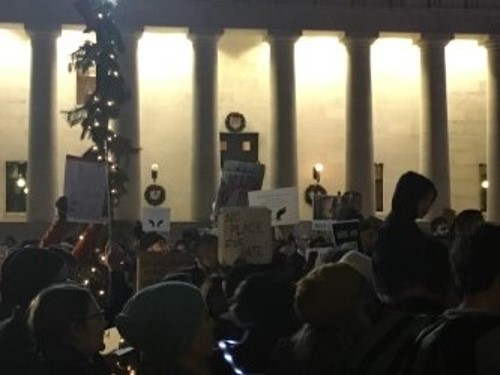
Columbus residents gather downtown to protest Donald Trump on Nov. 29. Credit: Daniel Smyth | Lantern Reporter
About 1,000 Columbus-area residents marched from Goodale Park to the Ohio Statehouse on Tuesday night, condemning what they referred to as “bigotry” from President-elect Donald Trump’s incoming administration.
The sidewalks of North High Street were flooded with protesters chanting phrases such as “No Trump, no KKK, no fascist USA” and “Columbus united, we’ll never be divided”.
This protest was one of several that has taken over the downtown area since the Nov. 8 presidential election which Trump won. Other protests have taken place around the city, including multiple on campus.
Taylor True, a second-year in sociology and political science, attended a similar demonstration outside the Statehouse on Nov. 10, motivated by her dislike of the president-elect.
“I was really upset and couldn’t get out of bed (after the election),” she said. “I felt that everything the students had been fighting for, such as diversity and minority rights, were being set back by the election.”
Though True had attended rallies and protests before — such as the vigil in remembrance of Tyre King, who was fatally shot by police after they said he produced a BB gun that was mistaken for a real gun — she said Trump’s win inspired her and her friends to become more politically active.
“The protests have consolidated a movement of everyone who feels negatively affected by the election, whether they are directly affected or they feel that people they know may be affected,” True said.
Nathaniel Swigger, a political science professor at OSU’s Newark campus, acknowledged that some protesters want to pressure Electoral College members to change their vote. He said that is “frankly, not likely to work”
“After (Trump) was elected, I felt like I needed to do something, say something, to let the people who felt so marginalized throughout his campaign know that there are people out there fighting for them.”— Adam Grachek, third-year in environmental engineering, protest attendee
Instead, he said protesters may be inspired by fears for how the incoming administration may treat minorities, or from a desire to overhaul how the Electoral College works.
“I think there are protesters starting to realize the American election cycle sucks,” he said. “We currently don’t have a system that values all voters equally — we see that in the Electoral College and we see that in gerrymandered House districts.”
Adam Grachek, a third-year in environmental engineering, also attended some of the protests and said they have enabled him to stand up for what he called the “continuous degradation of minority groups.”
“After (Trump) was elected, I felt like I needed to do something, say something, to let the people who felt so marginalized throughout his campaign know that there are people out there fighting for them,” Grachek said.
Grachek, like other students, however, did not picture themselves standing up for a political cause until Trump ran for president.
“Before coming to Ohio State, I never really thought about protesting anything, but as a freshman and a sophomore, I was definitely feeling the angst of wanting to get involved,” Grachek said. “(It wasn’t) until Trump was actually elected that I was able to do so.”
Millennials, such as Grachek and True, play a large part in initiating these political gatherings, Swigger said.
“We have seen increases in youth voter turnout and youth political engagement over the last couple of election cycles, and I think that has a lot more to do with the state of country now as opposed to 16 years ago,” Swigger said. “More and more people feel like they have to get involved.”
Technology helps millennials arrange today’s protests.
“(Social media) is an interesting way of expanding communication and solving a lot of coordination problems that often arise with protests,” Swigger said.
The atmosphere of the gatherings has given her a sense of community with like-minded individuals and has helped her accept the election’s result, True said.
“There is a lot of anger (at the protests), but there is also a lot of hope and love,” she said. “I don’t think either (emotion) is more important than the other.”


